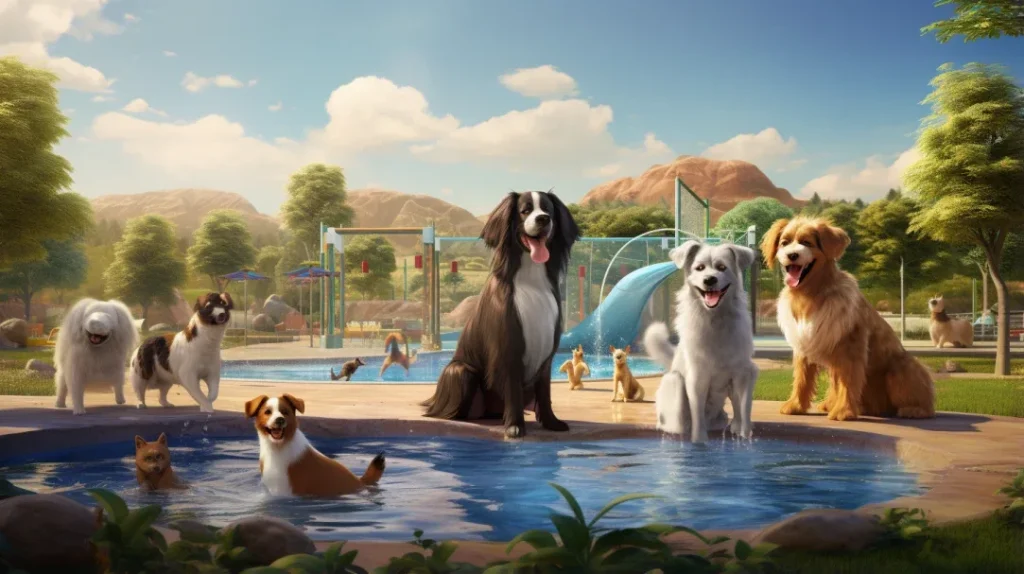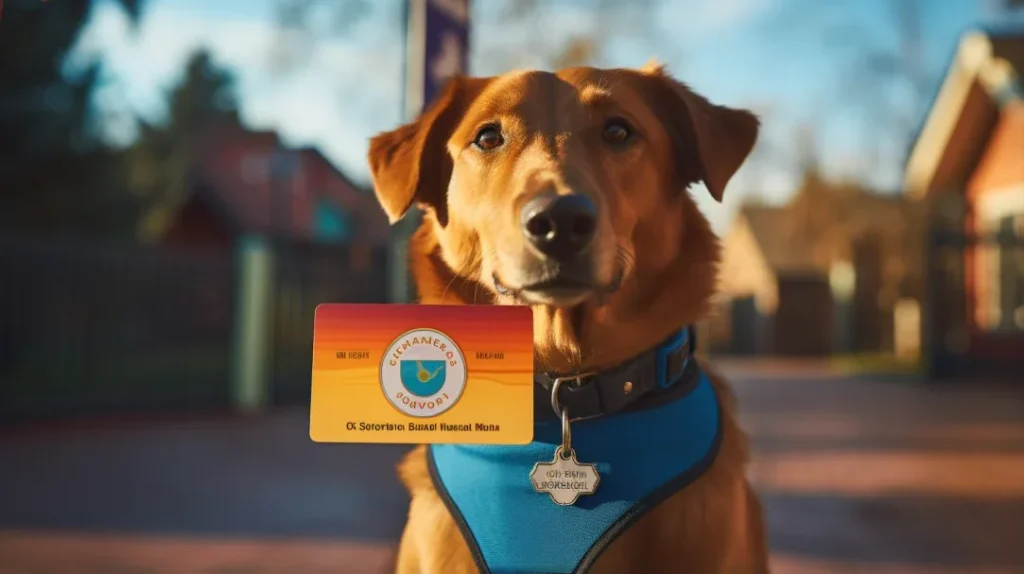Welcome to the Dog Owner’s Handbook, where you’ll uncover your responsibilities and rights and unravel the mysteries of the Georgia Act.
This thorough book will help you navigate the complex world of dog ownership like a compass in new country. We’ll explore everything from understanding your obligations as a responsible dog owner to advocating for your rights.
So grab a leash and embark on this enlightening journey into canine companionship.
Key Takeaways
- Dog training is essential for the well-being and safety of your dog, preventing behavioral issues and promoting mental stimulation.
- Socializing your dog from an early age reduces fear and anxiety, creating a well-rounded and confident companion.
- Understanding your dog owner’s responsibilities and rights ensures the best care for your furry companion.
- The Georgia Act establishes clear guidelines for responsible dog ownership, addressing leash laws, vaccinations, and licensing to promote the health and welfare of dogs.
What is the Dog Owner’s Handbook?
The Dog Owner’s Handbook is a comprehensive guide that outlines the responsibilities and rights of dog owners. It provides valuable information on caring for your furry friend and ensures a safe and nurturing environment for them.
This handbook also covers the Georgia Act, a set of laws to protect animals and prevent cruelty. It details the minimum requirements for animal care, safe transport, and the control of pets to avoid any nuisance. It also provides guidance on handling exotic animals and the proper protocol for reporting animal abuse.
As a responsible dog owner, you must know your responsibilities, such as ensuring your dog receives proper veterinary care, providing a suitable living environment, and effectively controlling their behavior in public spaces. It also emphasizes the importance of bonding with your pet through love, care, and training.
The Dog Owner’s Handbook serves as a valuable resource for both new and experienced dog owners, offering essential information and practical advice to promote the well-being of dogs and foster a robust dog-owner relationship.
Understanding Your Responsibilities as a Dog Owner
Responsible dog owners demonstrate their commitment to their canine companion’s well-being through various actions and decisions. This includes completing a registration application with a recognized organization like the AKC, ensuring their pet’s health through regular check-ups at health clinics, and potentially investing in pet health insurance for added security.
An ethical breeder is chosen to obtain the dog, as they adhere to responsible breeding practices and offer health guarantees for the puppies they produce. Responsible breeders also participate in performance and competitive events to promote their dog’s physical and mental well-being. They maintain acceptable behavior in public spaces, ensuring their furry friend is friendly, clean, and well-mannered during outings.
1. Providing Proper Veterinary Care: Your dog’s health and well-being should be top priorities. This means ensuring they receive regular check-ups, vaccinations, and necessary medical treatments. It is also essential to keep up with routine grooming and hygiene practices to keep your furry friend clean and healthy.
2. Creating a Suitable Living Environment: Dogs need a safe and comfortable environment. This includes providing them with a clean and well-maintained living space, indoors or outdoors. Ensure they have access to fresh water, proper nutrition through a balanced diet, and appropriate shelter from extreme weather conditions.
3. Training and Socialization: Dogs require training to become well-behaved members of society. This involves teaching them basic commands leash manners, and socializing them with other animals and people. Exercise also helps ensure their safety and the safety of others.
4. Responsible Control: As a pet owner, you are responsible for effectively controlling your dog’s behavior in public spaces. This means keeping them leashed or under voice control, especially in areas where leashes are required. It also involves being aware of your dog’s behavior and intervening to prevent harm or inconvenience to others.
5. Responsible Waste Management: It is essential to clean up after your dog. Always carry waste bags while walking your dog and dispose of their waste appropriately. Not only is this a responsible and hygienic practice, but it also helps keep public spaces clean for everyone to enjoy.
6. Love and Companionship: Dogs are social animals and thrive on love and companionship. Ensure you spend quality time with your dog, providing them with affection, attention, and mental stimulation. Regular exercise and playtime are essential for their overall well-being and happiness.
Responsible owners prioritize their pet’s dental health to prevent issues like gum disease and have an evacuation kit in place for emergencies. They engage in genetic testing when necessary to assess potential health risks, provide an honest assessment of their dog’s behavior, and may even participate in educational seminars to enhance their knowledge as caregivers. Lastly, being part of the largest registry, such as AKC, can help maintain records and support the responsible ownership of dogs.
Know Your Rights as a Dog Owner

Make sure you’re aware of the rights you have as a dog guardian. As a responsible dog owner, it’s essential to understand your legal obligations and the privileges that come with being a dog owner.
Here are some fundamental rights to keep in mind:
- The right to own a dog: You can legally own and care for a dog.
- The right to choose your dog’s name: You can give your furry friend any name.
- The right to decide about your dog’s healthcare: You can determine vaccinations, medical treatments, and overall well-being.
Knowing your rights as a dog owner is essential in ensuring you provide the best care for your furry companion. However, it’s equally important to understand the legal obligations that come with these rights.
Now, let’s unravel the Georgia Act and explore what you need to know!
Unraveling the Georgia Act: What You Need to Know
In this discussion, we’ll unravel the Georgia Act and give you a thorough understanding of its key points.
First, let’s provide an overview of the act and its impact on dog owners in Georgia.
Then, we’ll discuss the rights and obligations of owning a dog under this act.
Act Overview and Impact
The Act provides a comprehensive overview and highlights its impact on dog owners in Georgia.
The act’s impact:
- It establishes clear guidelines for responsible dog ownership.
- It promotes the health and welfare of dogs.
- It addresses issues such as leash laws, vaccinations, and licensing.
The Act provisions include:
- Licensing requirements: All dog owners must obtain a pet license to ensure proper identification and registration.
- Leash laws: Dog owners must keep their pets on a leash outside their property to prevent accidents or incidents.
- Vaccination mandates: Dogs must be up-to-date on vaccinations, protecting them from dangerous diseases while safeguarding public health.
These provisions aim to create safe environments for both dogs and communities. By following these guidelines, dog owners can contribute to the well-being of their pets and promote harmonious relationships with neighbors.
Rights and Obligations
By following the guidelines outlined in the Act, dog owners can ensure their pets’ well-being and contribute to a harmonious community.
Dog ownership comes with legal obligations that every owner must be aware of. Firstly, providing proper care and shelter for your furry friend is essential. This includes providing adequate food, water, and a safe environment.
Additionally, regular veterinary check-ups and vaccinations are mandatory to keep your pet healthy and prevent the spread of diseases. Another crucial obligation is controlling your dog’s behavior in public spaces. This means keeping them leashed outside and ensuring they do not disturb or harm others.
Lastly, being a responsible dog owner also means cleaning up after your pet’s waste to maintain cleanliness in public areas.
Common Misconceptions Clarified
One common misconception about dog ownership is that all dogs are aggressive when, in reality, many breeds can be gentle and friendly. Understanding these misconceptions is essential to provide the best care for your furry friend.
Here are some common misconceptions clarified:
- Misconception: All dogs are aggressive.
- Reality: Many breeds can be gentle and friendly.
- Misconception: Dog training is not necessary.
- Fact: Proper training is crucial for a well-behaved and obedient dog.
- Deception: Outdoor activities with dogs are always safe.
- Fact: Safety concerns exist, such as potential dangers or interactions with other animals.
Understanding these misconceptions helps you make informed decisions about your dog’s training and outdoor activities.
However, good dog training and socialization are essential for a happy and healthy relationship with your pet.
The Importance of Proper Dog Training and Socialization

You prioritize proper dog training and socialization to ensure a well-behaved and happy canine companion. Good dog training involves teaching your dog basic obedience commands such as sit, stay, and come. It also includes leash walking, crate training, and housebreaking. Socialization is equally important as it helps your dog become comfortable around other dogs, people, and various environments.
To help you understand the importance of proper dog training and socialization, here is a comparison table:
| Proper Dog Training | Socialization |
|---|---|
| Teaches obedience commands | Helps your dog become comfortable around other dogs |
| Includes leash walking and crate training | Allows your dog to interact with different people |
| Assists in housebreaking | Exposes your dog to various environments |
Ensuring the Health and Well-being of Your Dog
Your pet’s pleasure and quality of life depend on their health. Paying attention to their nutrition and exercise routine is necessary to keep your dog in optimal health.
Here are some key points to consider:
- Dog Nutrition: Provide a balanced diet with high-quality protein, healthy fats, carbohydrates, vitamins, and minerals. Discuss your dog’s food and portion sizes with your vet.
- Exercise Routine: Regular physical activity is crucial for maintaining a healthy weight and promoting mental stimulation. Establish a consistent exercise routine that includes daily walks, playtime, and interactive games. Consider your dog’s breed, age, size, and energy level when planning their exercise regimen.
Responsible Dog Ownership: Licensing and Identification

Following the guidelines the Georgia Dog Owner’s Handbook sets forth is essential to license and adequately identify your furry companion.
Dog licensing is a legal requirement in Georgia, and it helps ensure that dogs are vaccinated against rabies and can be quickly reunited with their owners if they go missing. The process is straightforward—visit your local county office or animal control agency to obtain a license for your dog.
As for identification methods, there are several options available. Dog owners commonly use collars with ID tags that include their contact information. Microchipping is another popular method, where a tiny chip containing owner details is implanted under the dog’s skin.
Providing a Safe and Enriching Environment for Your Dog
When providing a safe and enriching environment for your dog, one of the key considerations is whether to keep them indoors or allow them outdoor access.
Both techniques offer merits and cons, so consider your dog’s needs and circumstances.
Additionally, mental stimulation is crucial for your dog’s overall well-being, so we’ll discuss some tips on how to keep their minds engaged and active in different ways.
Indoor Vs. Outdoor
It’s important to consider whether your dog will primarily be an indoor or outdoor pet. Both options have benefits and training considerations that you need to consider. Here are a few things to keep in mind:
Indoor:
- Provides a controlled environment for your dog’s safety.
- Easier access for potty training and cleanliness.
- More opportunities for social interaction and bonding with family members.
Outdoor:
- Allows dogs to explore, exercise, and experience natural stimuli.
- Provides ample space for dogs with high energy levels.
- Requires additional measures for protection against weather, predators, and escape attempts.
When deciding between indoor versus outdoor living arrangements, consider your dog’s temperament, breed characteristics, lifestyle needs, and preferences. Remember that both options can be suitable if you provide adequate care, attention, and training.
Mental Stimulation Tips
Ensure you provide plenty of mental stimulation for your furry friends to keep them engaged and prevent boredom. Dogs are intelligent creatures who thrive on mental challenges, so finding ways to engage their minds is essential.
Canine puzzles and interactive toys are great tools for this purpose. Canine puzzles stimulate your dog’s problem-solving abilities by hiding treats or toys inside compartments they have to figure out how to open. These puzzles come in various difficulty levels, so you can gradually increase the challenge as your dog becomes more adept.
Interactive toys, such as treat-dispensing balls or puzzle feeders, also stimulate your dog to work for their food or treats.
Managing Dog Waste: The Scoop on Proper Disposal
Properly disposing of dog waste is an essential responsibility for every dog owner. Not only does it help to keep the environment clean, but it also prevents the spread of diseases and parasites. Here are a few tips on proper disposal and waste management:
- Always carry waste bags when you take your dog for a walk.
- When your dog does business, use the bag to pick up the waste.
- Tie the bag securely and dispose of it in a designated trash bin.
By following these simple steps, you can do your part in maintaining clean and hygienic public spaces.
Now that you know how to dispose of dog waste properly, let’s move on to another critical aspect of responsible dog ownership: navigating public spaces, including leash laws, and finding dog-friendly areas.
Frequently Asked Questions
What is the Georgia Responsible Dog Owner Act?
As of my last knowledge update in September 2021, I don’t have specific information on a “Georgia Responsible Dog Owner Act.” Laws and regulations related to dog ownership can vary by state and region and may change over time. I recommend checking with the Georgia Department of Agriculture or a local legal authority for the most current information on dog ownership laws in Georgia.
Can you provide some responsible dog owner quotes?
Certainly! Here are a few quotes related to responsible dog ownership:
- “Owning a dog is not just a privilege—it’s a responsibility.”
- “A responsible dog owner is a faithful steward of the life in their care.”
- “The best therapist has fur and four legs.”
- “Responsible dog owners understand that their pet’s happiness depends on their love and care.”
- “A dog doesn’t care if you’re rich, poor, smart, or dumb. Give him your heart, and he’ll give you his.”
What are the legal responsibilities of dog owners?
The legal responsibilities of dog owners can vary by location but often include:
- Registering the dog with local authorities if required.
- Ensuring the dog is properly vaccinated and licensed.
- Controlling the dog in public spaces with a leash.
- Preventing the dog from causing harm or injury to people or other animals.
- Addressing any damages or injuries caused by the dog, including covering medical expenses.
- Complying with breed-specific legislation if applicable in the area.
- Properly caring for the dog’s physical and emotional needs.
What is a responsible dog owner pledge?
A responsible dog owner’s pledge is a commitment to providing proper care, love, and attention to one’s dog. It includes a promise to meet the dog’s physical, emotional, and social needs and to follow legal and ethical responsibilities associated with dog ownership.
What is the responsibility of a dog owner if their dog bites someone?
A dog owner is usually liable for injuries or damages caused by a dog bite. Liability depends on local regulations, the incidence, and whether the owner took reasonable precautions to prevent the bite. Dog owners should typically report the incident and cooperate with any investigations or legal proceedings that may follow.
Conclusion
In conclusion, being a responsible dog owner is fulfilling yet challenging. By understanding your responsibilities and rights and familiarizing yourself with the Georgia Act, you can ensure the well-being of your furry friend and maintain harmony in your community.
Proper training and socialization are crucial for a happy and obedient pet. Providing a safe environment, managing waste responsibly, and respecting leash laws will contribute to a harmonious coexistence in public spaces.
So grab that leash and embark on an adventure with your four-legged companion!
Quick Paw Note: While we’re passionate about providing helpful pet nutrition content, it’s essential to remember that this info isn’t a substitute for professional veterinary advice. Always consult your vet for your pup’s specific dietary needs. We strive for accuracy, but paw-lease note that we can’t guarantee the complete reliability of all content. Stay pawsome! 🐾




